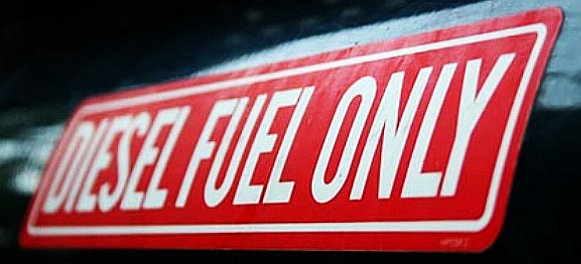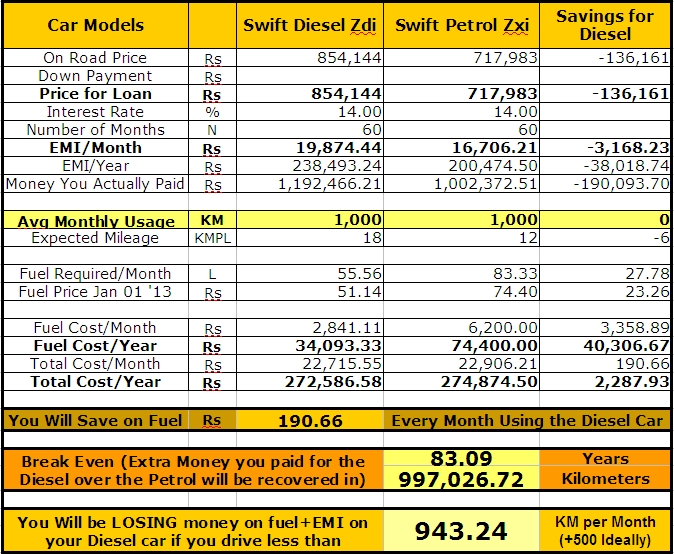When it comes to vehicles and general Indian populace, the saying “Little knowledge is a dangerous thing” acquires new dimensions in its meaning. Forget treating 800cc cars as a status symbol and defining masculinity as per your presence and command on the road and your ability to make all the World fall at your feet through your driving, this also comes into play when it comes to chosing the fuel for your car. Indians are somehow so emotionally involved with their cars, more than what they would be with their better halves, that logic and reasoning goes out of the power window when it comes to vehicle related matters, so much so that they think spoilers on top of front wheel drive hatches will increase “power” somehow and so on.
But nothing, nothing beats it when it comes to fuel efficiency and fuel. We Indians are so fiercely protective of fuel efficiency that nothing can stop us from wringing out those extra meters out of every last drop of fuel.
What Car to Buy? Diesel, of Course! We Are Going to be Rich off it!
Let us say you are looking around to retire that ancient Maruti 800 your dad has been driving since seemingly the beginning of time. Only because you are fed up of that chubby aunty who pulls your cheek and lovingly embarrasses you in front of everybody by narrating the story of how you peed on the backseat when you were only nine months old. Of course, the most sensible alternative to the old warhorse would be today’s hottest hatch that seems to swallow anyone who sits in it. Yes, the Maruti Swift (Also pronounced Shift, Sift, Shit and so on), the car that put the upper part of the middle middle class and deep-pocketed students on wheels. The car is still car of choice when it comes for anyone looking to upgrade from a smaller hatch to a bigger hatch. So, that decision is easy.
Once the model of car to be bought is decided, there is only one more decision to be taken with regard to purchase, which is of course, “kitni degi” average, mileage, fuel efficiency. When Metallica composed “Nothing Else Matters“, they actually were singing about the importance fuel efficiency plays in the decision making of process of Indian car-buying. Only fuel efficiency matters and nothing else. Not Performance, ride, handling, interiors, material quality, safety, features, space, specs, tyres, trim nothing. Diesel is always chosen over petrol for perceived monetary benefits due to lower cost of the fuel and higher mileage. Buyers jump to diesels no matter what they buy the car for, not considering the advantages/disadvantages both fuels have over the other or the 8-month waiting periods and 2 lakhs+ more on-road prices. Most people just blindly believe that Diesel=Money in the bank by default, thanks to some preconceived notion fueled only by the fuel price difference and mileage figures. But that is not so. Most people spend more money than they should buying diesel cars while a petrol one would be best suited for them, and actually end up making no substantial savings!

It might come as a shock, but in reality, many people actually lose money because they bought a Diesel car! If not used properly, that is. And this can be proven, using simple Mathematics. So for that, let us go back to the Swifts to do an extended calculation on the feasibility of buying a diesel car over a petrol, comparing high-end Maruti Swifts. This will show an example as when to buy a diesel car over a petrol. All prices are Bangalore.
- Swift VXi (Petrol) on road cost Rs. 717,983, EMI for which will be Rs.16,706/month
- Swift ZDi (Diesel) on road cost Rs. 8,54,144, EMI for which will be Rs.19,874/month
- Imagine your average monthly usage to be 1000 km driving. (33 km per day)
- Mileage expected for the Petrol: 12 kmpl and for the Diesel: 18 kmpl
- As a result, the petrol will drink 83.33 liters per month and the diesel 55.56 liters per month.
- At current prices, the petrol will cost you Rs.6,200/month and the Diesel just 2,841/month!
That seals it! The petrol Swift will drink for more than twice the amount what the diesel would! Case enough to go for a diesel car! You would be saving Rs.3,359 a month on fuel buying a diesel car, right? Right. But it does not end there. On the 7th of every month, your not-so-friendly neighborhood bank will extend its long tentacles into your bank account and snatch away a part of your soul that you own them forever. Here comes the remainder of the calculation which entails actual cost of ownership for petrol vs diesel after taking into account the EMI you pay through your nose.
[box_light]Cost of ownership per month for the petrol (fuel cost+EMI) = 6200+16706 = Rs. 22,906
Cost of ownership per month for the diesel (fuel cost+EMI) = 2841+19874 = Rs. 22,716
Difference in cost of ownership, hence savings of the diesel over the petrol = Rs. 191 per month!
At the rate of savings of Rs.191 per month, it will take you a very small span of just 83 years and/or 997,027 kilometers to recover the amount you paid for the diesel over the petrol. Regarding the Swift Z models in particular, another bit of calculation reveals that unless you drive 943.26 kilometers every month on an average, you will be actually losing money on the diesel car! Makes economic sense? Yes? OK. Just don’t forget to include your grandchildren in the will so they can party after finally recovering the amount you had spent on the car. By buying a diesel car that you don’t drive much, you will only be spending more money instead of saving it! And this is exclusive of yearly renewal insurance premiums and maintenance costs, both which will be higher for diesel. Here is the entire calculation below. You can use the same calculator to easily compare diesel and petrol versions for any car model.
To do that, download this excel sheet diesel savings calculator for the calculation above that I have created to calculate running costs and savings on diesel over petrol cars for any car models by comparing the two variants. Calculate years to be owned and kilometers to be driven for break even and minimum usage in kilometers to be driven for diesel cars to save you money over petrol cars. Complete with formulas. Just enter the correct values for on road price, distance driven, mileage and fuel prices.
The Truth Behind the Diesel Mania
A diesel car you bought for everyday usage thinking it would save you bricks of money will end up saving you less than what you alone can blow up in KFC in one sitting! And if you think the sticker-price difference a petrol and diesel have does not matter and can be recovered in a matter of months in lieu of “savings” the diesel will offer you, think again. The calculation of ROC (Return on Cost) (I am not using ROI – Return on Investment because a car is NOT an investment!) of a Diesel car compared to a Petrol totally depends on market forces and the usage of your car and is not a static value. Without realizing this extended mathematics, people go ahead and pay a couple of lakhs more for cars that would be lying idle in their porches, when they could have paid lesser for cars which would lie idle in their porches. And now that Diesel fuel prices have been deregulated in India, it would be prudent not to mke any long-term plans for diesel cars, as the impact of the upcoming diesel price hikes will be severe in the long run.
In MBA marketing class, we were repeatedly hammered with the phrase “Indians are emotional and view everything from an emotional, quick gratification perspective”. We were advised to keep this in mind while designing marketing campaigns for Indian markets. Unfortunately, no matter how cliched it might sound, this is the truth. Nothing explains better our tendency of cutting corners and glorifying jugaad and “order in chaos”. This principle applies to the “Diesel mania” as well. The emotional relief that comes while paying less at the petrol pump (station) mostly is the sole reason why most buyers opt for Diesel cars, not taking into account the economics of details, reasoning and logic. This emotional string attached to fuel-spending does help one feel good at the moment, but the extra couple of lakhs spent at the showroom will be haunting you silently in the unseen background, and will come back to pinch you on the 7th, negating any savings you had made on fuel. But again, the emotional quotient attached with EMI payment is less, as it is accepted as an inevitable truth kind of thing and is considered fixed expense and does not figure in capital expenditure.

Engines, Maintenance, Driving and Resale
Diesel engines have improved a lot in technology over the years with CRDi and other technologies. But still, the basic way a Diesel engine burns its oil still remains the same old crude method which reflects in the refinement of the engine. The clatter and vibration of the oil burner can still be felt even in the cabins of many high-profile cars, and it is a fact that in many cases, maintenance costs of diesels are higher than that of petrols, especially in the long run. The argument that today’s diesels are as punchy and fun to drive as petrols comes from the misconception that it is the engine which does all the work. In fact, it is not. It is the Turbo that delivers the “punch”. usually, Turbos kick in only at 2000 RPM or higher, which is why Diesels cannot really get that initial acceleration. This is called “Turbo Lag”, while Petrols do not have such hangups, which makes petrol cars performance cars and driving enthusiasts being called “Petrolheads” and not Dieselheads (ugh). Also, diesel pollutes the environment much more than petrol does. Resale value of diesel cars is obviously much higher than petrol cars, but this again, is dependent on market forces. If diesel retail prices come closer to petrol prices, this trend will turn on its head.
When Should I Buy A Diesel Car?
If you are intent on saving reasonable amounts of money, Buy a Diesel ONLY if
- You drive a whole lot, something like more than 2000 km in a month
- You plan to keep your car for a long time (5+ years) – cost recovery+savings
- Petrol and Diesel models are priced close to each other
- You don’t really take pleasure in the “driving experience”, “smoking off the line” and other performance benefits
- You hit the highway for long drives quite often.
- SUVs, MUVs, Taxis, Load-pulling, Torque Requirements…
- Diesel price deregulation – Add another 500 km to the above 2000.
If you do the everyday office-home-shopping city driving routine, a petrol car is best suited for you.
But if you want to REALLY save money, there is another easier method, though a bit more cumbersome. Leave the car at home and take the bus or train. I save around Rs.5000 every month taking BMTC Volvos to office, the money which I use to buy nice things.






Kudos on this. Hope very so called dieselhead reads this.
Thank you bro! Yeah, hopefully! :)
Awesome.. Need to show this to my dad :)
Thank you! Why? Please let me know what his comments were… :)
Buddy, all info you have put up is right except one.
Can you please highlight some facts which shows diesel polluting the environment more than petrol?